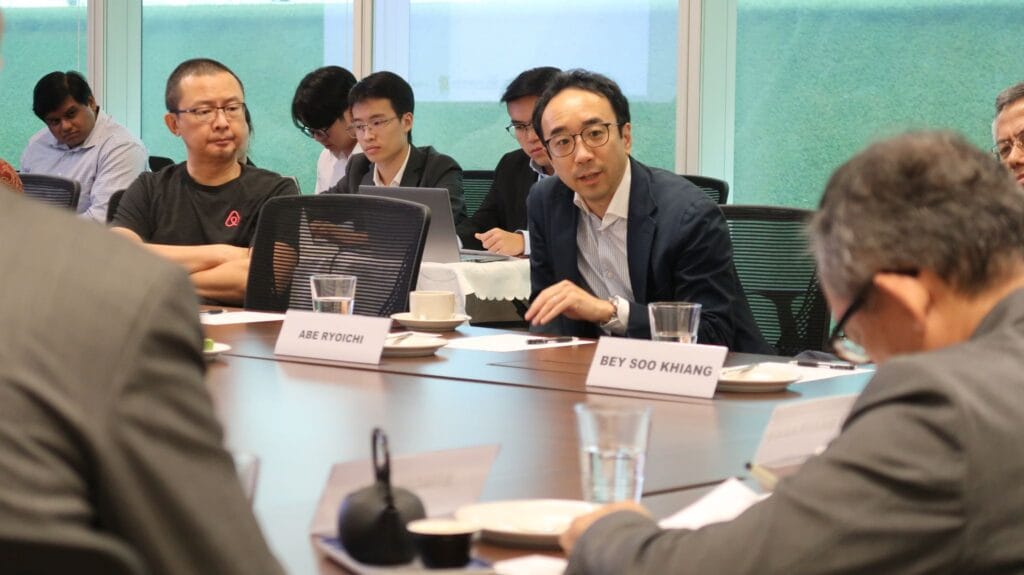The Constitution (Amendment) Bill passed in 2019 lowered the voting age of Malaysians from 21 to 18 years old. This resulted in approximately 5.8 million first-time voters heading to the ballots, a considerable number, given that the electorate consisted of 21 million eligible voters in the 15th General Election (GE15). As a new generation of youth voters enter the political landscape, Mr. Shahril Hamdan, former information Chief of the United Malays National Organisation (UMNO), shared his insights about the future role and the implications of changing demographics in Malaysian politics at a roundtable lunch organised by the Singapore Institute of International Affairs (SIIA) on 2 March 2023.
Key Demographic Trends
Mr. Hamdan began by outlining the four key demographic trends that will determine Malaysia’s future political landscape – the growing urban population, increasing skills-based underemployment, changing demographics and multicultural dynamics, and strong youth engagement in politics.
Firstly, while the urban population in Malaysia is growing steadily, it will be accompanied by urban poverty and other social ills. The assimilated rural population currently face challenges in securing new income opportunities, and income inequality has become an emerging issue – the current median wage is scarcely higher than the poverty line, which suggests that dual-income earning households are necessary to stay above the poverty line. Given that a substantial proportion of the labour force indicated that they were either unpaid, or self-employed, the urban poor will be faced with the growing challenge of stagnating wages and worsening social services.
Next, while education levels and skills-based labour have both increased substantially in Malaysia, skills-based underemployment has become a key issue in both political and public spheres of attention. Workers feel like they lack fair compensation, and the persistent wage gap between Malaysia and Singapore has resulted in the sustained problem of brain drain. While low competition for wages is a factor preventing salary adjustment and affecting wage stagnation, there is a need to consider the influence of education outcomes on jobs. Mr Hamdan took the opportunity to reiterate the importance of education programmes which increase the employability of Malaysians.
Third, the nature of multiculturalism is changing in Malaysia. Multiculturalism now exists in siloed bubbles, a by-product of social stratification along ethnic, socio-economic and geographic lines. While the upper and upper-middle classes are shielded from this trend, ethnic identities remain strong for the rest of the population. This difference is further exacerbated by social media platforms and communication channels, where different groups gravitate towards using certain social media platforms. This will eventually change how politicians approach and engage different demographic groups, as evidenced during the recent GE15.
Lastly, the large youth turnout in GE15 signals that there is still strong youth engagement in politics, despite most of the electorate being less educated and lower-skilled. This will amplify the political pressure exerted by growing youth anti-establishment sentiment and support for short-term populist measures. Youth voters now demand an immediacy in policy outcomes and are more receptive to short, impactful messages, as opposed to lengthy manifestos. They also increasingly view the political class with less deference than their older counterparts, and believe that politicians should serve their interests.
As a final remark on recent trends, Mr Hamdan noted that the recent gains by the Malaysian Islamic Party (PAS) in GE15 is not indicative of rising religious conservatism. He believes that majority of the Malay population adopts a more moderate stance than the politically driven Islamist factions. Increased support for PAS is not ideologically motivated, but rather a sign of protest against Barisan Nasional (BN) and is to be expected, considering Pakatan Harapan’s (PH) low support base from Malays historically. Mr. Hamdan cautions that acknowledging voting along religious lines would proliferate political rhetoric and encourage it’s use as a political tool. This would inadvertently ignite religious sentiment and cause further division.
Challenges for the Political Class
Given these demographic shifts, the political class are faced with the challenge of ensuring Malaysia’s growth amidst changing and emerging socio-political issues. While the current geopolitical climate presents a “once in a generation opportunity” to attract Foreign Direct Investment (FDI) inflows, it must be leveraged within the next 10-15 years. There has been greater focus among politicians in determining which industries should be prioritised, but the primary challenge remains balancing long-term policy planning alongside short-term populist demands. Mr. Hamdan believes that a balance of political acumen, capital and influence is necessary for this to happen, and hopes that future politicians will be attuned to Malaysia’s key challenges.
Future Wagers for Malaysian Politics
Mr. Hamdan is confident that the current government will remain in power for the duration of its term, but continues to face headwinds against reform. Given the importance of optics in Malaysian politics, Anwar’s visits to public mosques and the adornment of visibly plain clothing shows an attempt at changing his reformist image. This is in hopes of appealing to the Malay electorate and appear grounded without compromising on his policy platforms.
PAS is also likely to remain a unidimensional political force, relying on racial and religious sentiment to garner political support. Addressing the upcoming six state elections, Mr. Hamdan believes their proximity to GE15 as well as the unexpected and public uncertainty over the BN-PH coalition have created priced-in expectations for a “Green Wave”. However, he noted that the indicator of any ‘real gains’ would be from PAS’s performance in Selangor – a traditional PH stronghold, rather than expanding their existing majorities in Kedah, Kelantan and Terengganu.
With regards to the new government’s approach to the economy, it remains to be seen if the Anwar government will propose any significant structural reforms. Mr Hamdan notes that the tabling of the 2023 Budget was too early to contain any significant reform policies, especially given that some are likely to be highly controversial, like those surrounding fisherman subsidies. While such policies may be economically sound, they are also deeply unpopular and require no small degree of political skill to navigate.
![[Premium] Shahril Hamdan: Demographic Shifts to Change the Course of Malaysian Politics](https://siiaonline.org/wp-content/uploads/2023/03/2023_Insights_FB-LinkedIn-1.jpg)



